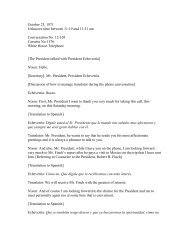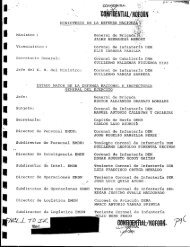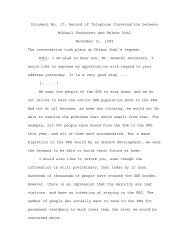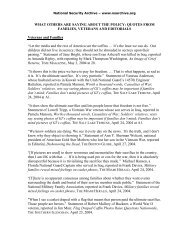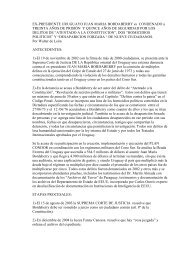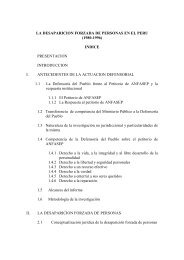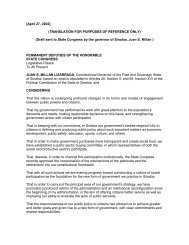- Page 6:
Chapter 1:VIRUS: How the invasion o
- Page 9:
arranged meeting point for the emer
- Page 12 and 13:
that Orlov-Morozov wrote to the Cen
- Page 14 and 15:
political situation developing in t
- Page 16 and 17:
as accomplices, received long-term
- Page 18 and 19:
World War II, Prince Daoud Khan, th
- Page 20 and 21:
“Can you imagine, Comrade General
- Page 22:
no idea that some destructive polit
- Page 28 and 29:
General Gorelov was particularly co
- Page 30 and 31:
ascent. One plane, flying low above
- Page 32 and 33:
would retrieve vodka along with gla
- Page 34 and 35:
laid down on the couch. He felt pre
- Page 36 and 37:
possible contingency. Any unforesee
- Page 38 and 39:
In July 1973, Major Qadir and his g
- Page 40 and 41:
the Parcham faction, also became mi
- Page 42 and 43:
the military transport division of
- Page 44 and 45:
on the morning of April 27, the off
- Page 46 and 47:
there were passwords. I think Amin
- Page 48 and 49:
commander suddenly stopped and turn
- Page 50 and 51:
in the lead tank, which was compris
- Page 52 and 53:
KGB colleagues, exiting the embassy
- Page 54 and 55:
married?”“I wonder whose side t
- Page 56 and 57:
detachments. The analyst of the Res
- Page 58 and 59:
front of the airport and drove back
- Page 60 and 61:
complained to him, “Your trade re
- Page 62 and 63:
“What’s wrong? Should I call a
- Page 64 and 65:
awaiting further instructions. My a
- Page 66 and 67:
well-prepared speech that touched u
- Page 68 and 69:
Youth”) in the 1940s. Babrak also
- Page 70 and 71:
eally need to act a year ago, becau
- Page 72 and 73:
After Daoud’s visit to Moscow, th
- Page 74 and 75:
that could be leveled against me or
- Page 76 and 77:
looming in the fields, to be handed
- Page 78 and 79:
“And what about Daoud?”“I don
- Page 80 and 81:
sent the commander of the President
- Page 82 and 83:
another Central Committee member, t
- Page 84 and 85:
forces in the country, which had be
- Page 86 and 87:
explosions in the night sky. Only a
- Page 88 and 89:
When the bodies were removed from t
- Page 90 and 91:
Chapter 2:“We Knocked Out Their T
- Page 92 and 93:
deputy resident gave Valery an indi
- Page 94 and 95:
trusted the deputy resident, who wa
- Page 96 and 97:
Alexander Victorovich puffed his pi
- Page 98 and 99:
As evening came, the city was shrou
- Page 100 and 101:
honor, religion, and property, we d
- Page 102 and 103:
evolution and kill the president if
- Page 104 and 105:
theory, thinks as if the Pashtun
- Page 106 and 107:
analyst’s intentions.***The morni
- Page 108 and 109:
Vladimir Alexandrovich was accustom
- Page 110 and 111:
intelligence officers, yet they wer
- Page 112 and 113:
“He thinks that he will recover s
- Page 114 and 115: Three years ago, General Leonov was
- Page 116 and 117: Politburo would be unpredictable. S
- Page 118 and 119: Tomorrow? What time? I think it’s
- Page 120 and 121: During the meeting, the issues of A
- Page 122 and 123: institutions. Afghan special servic
- Page 124 and 125: to prepare him to work in Afghanist
- Page 126 and 127: favor, and inquired as to the natur
- Page 128 and 129: “We will take care of all funding
- Page 130 and 131: services, and to discuss the budget
- Page 132 and 133: was short, without a moustache desp
- Page 134 and 135: children, and myself—and for the
- Page 136 and 137: “Yes guys, this list is extraordi
- Page 138 and 139: This time, General Zaplatin headed
- Page 140 and 141: through Reuters? Do we not have our
- Page 142 and 143: much to discuss.Ulyanovsky started
- Page 144 and 145: enewed force.“According to our fo
- Page 146 and 147: ***One evening Starostin was called
- Page 148 and 149: Parcham officers were passive on th
- Page 150 and 151: operative boss,” mused the deputy
- Page 152 and 153: glad that the Soviet comrades had a
- Page 154 and 155: wasn’t involved in any affairs of
- Page 156 and 157: the April Revolution.”The ministe
- Page 158 and 159: do.”“I have no doubt that we wi
- Page 160 and 161: invited to meet with Minister of Fo
- Page 162 and 163: thirty of them. Two of them were im
- Page 166 and 167: coordinate recommendations with eac
- Page 168 and 169: April Revolution.Then Karmal took t
- Page 170 and 171: low would be delivered that would u
- Page 172 and 173: “Because they are Parchamis.”
- Page 174 and 175: Having decided to marry his current
- Page 176 and 177: ambassador. He, on the one hand, ca
- Page 178 and 179: the state and party, which would me
- Page 180 and 181: Bobrak?”This was the extent of th
- Page 182 and 183: Indeed, there would be many more So
- Page 184 and 185: Kharazov was tasked by the Central
- Page 186 and 187: courtyard.”“Yes, of course.”
- Page 188 and 189: again.”With a clear sense of reli
- Page 190 and 191: counterintelligence managed to neut
- Page 192 and 193: treatment. He thought that he would
- Page 194 and 195: intervention. He had a very vague i
- Page 196 and 197: interpretation of events. However,
- Page 198 and 199: Amin interrupted him coldly: “I w
- Page 200 and 201: his tormentors to kill him.“Every
- Page 202 and 203: should ask your colleagues to be mo
- Page 204 and 205: years earlier, he was offered a pos
- Page 206 and 207: “Vladimir Alexandrovich,” begge
- Page 208 and 209: he intended to play his own game. I
- Page 210 and 211: was so enamored by the ideology of
- Page 212 and 213: in Russian, “Do chego zhe mir tes
- Page 214 and 215:
Starostin often would run into Frye
- Page 216 and 217:
were to stay for another year or tw
- Page 218 and 219:
“I think that, from the U.S. pers
- Page 220 and 221:
leaders were convinced that the Sov
- Page 222 and 223:
Thinking about Americans, Valery re
- Page 224 and 225:
cannot, with full certainty, qualif
- Page 226 and 227:
As Surnin predicted, a CIA operativ
- Page 228 and 229:
wish was for them to make the Afgha
- Page 230 and 231:
Listening to Boris Nikolayevich, Bo
- Page 232 and 233:
until Bogdanov took the floor. He d
- Page 234 and 235:
doubts as to the old Communist warr
- Page 236 and 237:
simply didn’t have the means to o
- Page 238 and 239:
one hand, there was truth to this s
- Page 240 and 241:
auspices of the “National Pashtun
- Page 242 and 243:
this version of events becomes the
- Page 244 and 245:
Kryuchkov remained silent, digestin
- Page 246 and 247:
‘true communist’ and his friend
- Page 248 and 249:
Babrak Karmal looked extremely conc
- Page 250 and 251:
“Think, who could receive this Ba
- Page 252 and 253:
Preparations for the first state vi
- Page 254 and 255:
The papers also published Comrade T
- Page 256 and 257:
young people at the square, told th
- Page 258 and 259:
influential Islamist organizations.
- Page 260 and 261:
him as though considering their con
- Page 262 and 263:
Politburo superseded all protocol.
- Page 264 and 265:
with obvious Soviet participation w
- Page 266 and 267:
“I am working, Leonid Ilyich!”
- Page 268 and 269:
Once, the professor and the future
- Page 270 and 271:
As soon as they entered Dvoryankov
- Page 272 and 273:
Khan, Valery treated Dvoryankov to
- Page 274 and 275:
Sometimes, one should act extremely
- Page 276 and 277:
ecame a colony of Britain. Afghan t
- Page 278 and 279:
“Valery, do you think that we wou
- Page 280 and 281:
in the committee by a bureaucrat fr
- Page 282 and 283:
300 Afghani, according to an exchan
- Page 284 and 285:
The decree authorized the re-exprop
- Page 286 and 287:
Having said goodbye to him, Valery
- Page 288 and 289:
Nikolai Alexandrovich Dvoryankov di
- Page 290 and 291:
American intelligence services, eve
- Page 292 and 293:
***Sergei Bakhturin, an assistant t
- Page 294 and 295:
wife were staying in the room. Vese
- Page 296 and 297:
On February 13, a reception in hono
- Page 298 and 299:
to invite the archaeologist to spea
- Page 300 and 301:
a little over two hours to fulfill
- Page 302 and 303:
keep hostages in captivity. In othe
- Page 304 and 305:
was discovered that the gas in the
- Page 306 and 307:
“But how would the safety of Mr.
- Page 308 and 309:
“But then you should realize that
- Page 310 and 311:
are not as alert. People are more a
- Page 312 and 313:
newspaper. He settled on the name G
- Page 314 and 315:
“‘The security operatives, havi
- Page 316 and 317:
get inside his car? How can his cal
- Page 318 and 319:
“Wipe your tears,” he said in a
- Page 320 and 321:
differs from the way they think as
- Page 322 and 323:
“He told me to pick up my cleats
- Page 324 and 325:
describing what had transpired in H
- Page 326 and 327:
“I wonder who this person is? I h
- Page 328 and 329:
Starostin was not surprised by what
- Page 330 and 331:
Badruddin Bahes was close to Muslim
- Page 332 and 333:
nationalist and anti-Soviet. Howeve
- Page 334 and 335:
while he ruminated, then stared abs
- Page 336 and 337:
A: We failed to capture the terrori
- Page 338 and 339:
Question from a correspondent of Th
- Page 340 and 341:
flag on it. The U.S. ambassador was
- Page 342 and 343:
7. Who were the terrorists? It seem
- Page 344 and 345:
perceived at the Center? It would s
- Page 346 and 347:
Chapter 5:Rebellion in Herat - Firs
- Page 348 and 349:
struggle had become a historical le
- Page 350 and 351:
Revolution.“I understand that you
- Page 352 and 353:
evolutionary, anti-party, and again
- Page 354 and 355:
architectural monuments, and other
- Page 356 and 357:
een assumed that the Soviets in Afg
- Page 358 and 359:
“All of our leaders are waiting f
- Page 360 and 361:
spoke with Amin,” Gromyko added.
- Page 362 and 363:
decide to send them to Afghanistan?
- Page 364 and 365:
mistakes that they have made. Even
- Page 366 and 367:
It was a brilliant ploy. Everybody
- Page 368 and 369:
necessary to justify possible milit
- Page 370 and 371:
Unexpectedly, Andropov moved to sup
- Page 372 and 373:
this government. But can our troops
- Page 374 and 375:
military divisions had been deploye
- Page 376 and 377:
e illiterate his whole life, and to
- Page 378 and 379:
economic reforms as the solutions.
- Page 380 and 381:
conversation. “I would like to in
- Page 382 and 383:
look of satisfaction. He motioned,
- Page 384 and 385:
in connection with the additional m
- Page 386 and 387:
ased on the Bolshevik experience. F
- Page 388 and 389:
would flee to Pakistan after the de
- Page 390 and 391:
General Staff for his ruthless exec
- Page 392 and 393:
crucial decisions in complex situat
- Page 394 and 395:
and respectful when he met with the
- Page 396 and 397:
eason Ivanov did not fall prey to s
- Page 398 and 399:
Morozov, Khotyaev, and Starostin to
- Page 400 and 401:
Marxist-Leninist theory at the time
- Page 402 and 403:
violating their sacred duty.”Osad
- Page 404 and 405:
community, and the sinfulness of se
- Page 406 and 407:
“Unfortunately, this is not alway
- Page 408 and 409:
attempting to build socialism in su
- Page 410 and 411:
“In an attempt to halt anti-gover
- Page 412 and 413:
5. Confidential contacts with S. A.
- Page 414 and 415:
factions. The document mentioned th
- Page 416 and 417:
with their requests for direct invo
- Page 418 and 419:
armed opposition.Further into his m
- Page 420 and 421:
esidencies. Halbaiev, the commander
- Page 422 and 423:
discussed, Comrade Amin appeared to
- Page 424 and 425:
authority. They figured that the mo
- Page 426 and 427:
the stage of advanced capitalism on
- Page 428 and 429:
Safronchuk.Amin pretended to be ast
- Page 430 and 431:
danger to him. However, it is possi
- Page 432 and 433:
example, what was the purpose of Am
- Page 434 and 435:
“This is what happened,” began
- Page 436 and 437:
Ivanov hesitated. There was a silen
- Page 438 and 439:
special typewriter. He also had to
- Page 440 and 441:
influence. This topic was last disc
- Page 442 and 443:
paratroopers, disguised in aviation
- Page 444 and 445:
consequences of the confrontation b
- Page 446 and 447:
the organizational talents of Hafiz
- Page 448 and 449:
Persian Gulf.Détente was coming to
- Page 450 and 451:
duration of the war in Afghanistan.
- Page 452 and 453:
eported and objectively interpreted
- Page 454 and 455:
countries, including Iran, Pakistan
- Page 456 and 457:
officers took a seven-month-long co
- Page 458 and 459:
Glotov and Alexander Dolmatov were
- Page 460 and 461:
You will be assisting me in special
- Page 462 and 463:
was surprised to find out that not
- Page 464 and 465:
The taxi driver sensed that his pas
- Page 466 and 467:
and PGU with great attention.“It
- Page 468 and 469:
“Valery, you should meet with Gul
- Page 470 and 471:
***Major General Zaplatin was very
- Page 472 and 473:
Zaplatin sternly glanced at the int
- Page 474 and 475:
The Afghan understood that the Sovi
- Page 476 and 477:
them.“Finally, here is the most i
- Page 478 and 479:
neighboring Pakistan to become a re
- Page 480 and 481:
Afghanistan. Comrade Taraki is faci
- Page 482 and 483:
deal with Amin work? Where do the o
- Page 484 and 485:
“It looks like the situation with
- Page 486 and 487:
analysts in the International Depar
- Page 488 and 489:
1. Find a way to remove H. Amin fro
- Page 490 and 491:
water has such healing properties t
- Page 492 and 493:
the other leaders of the faction wh
- Page 494 and 495:
was burning our hearts. We simply c
- Page 496 and 497:
carry out a coup d’etat by overth
- Page 498 and 499:
indignation of Czech citizens watch
- Page 500 and 501:
global revolutionary movement. That
- Page 502 and 503:
workers, avant-garde peasants, and
- Page 504 and 505:
Council in leading the party and st
- Page 506 and 507:
that is happening behind my back.
- Page 508 and 509:
Petrov responded sternly, briefly s
- Page 510 and 511:
clear to him that he had to return
- Page 512 and 513:
statement without the support of th
- Page 514 and 515:
There were also several plain-cloth
- Page 516 and 517:
People’s Palace, where a joint me
- Page 518 and 519:
position within the leadership of t
- Page 520 and 521:
greeting, he informed me that Amin
- Page 522 and 523:
Alexander Mikhailovich Puzanov, Sov
- Page 524 and 525:
I suggested that we kick them out i
- Page 526 and 527:
your man or Amin’s man?”“He w
- Page 528 and 529:
his friends had already been arrest
- Page 530 and 531:
By some strange coincidence, all of
- Page 532 and 533:
party, demanding that he remove the
- Page 534 and 535:
Afghan school teacher, Valery decid
- Page 536 and 537:
path. We must do everything possibl
- Page 538 and 539:
Taraki called Amin and spoke in Pas
- Page 540 and 541:
esolution. He was now in control of
- Page 542 and 543:
in an open power struggle. Or perha
- Page 544 and 545:
the Afghans? Maybe we should just h
- Page 546 and 547:
had helped create. It was clear tha
- Page 548 and 549:
activists.After he drafted the cabl
- Page 550 and 551:
“No, thank you. I’d rather she
- Page 552 and 553:
ecognized leader of the democratic
- Page 554 and 555:
the couch to flip through the Sovie
- Page 556 and 557:
custody of the Armed Forces of Afgh
- Page 558 and 559:
“I don’t think that will ever h
- Page 560 and 561:
you over to Amin,” Starostin repl
- Page 562 and 563:
Taraki, his family, or his allies.
- Page 564 and 565:
second truck would monitor the inte
- Page 566 and 567:
currency. Boris Semyonovich ordered
- Page 568 and 569:
session so that we might hear his e
- Page 570 and 571:
disappearance of Sarwari and the fo
- Page 572 and 573:
eplacing him, why did you shelter a
- Page 574 and 575:
interlocutor, ignoring Kurilov’s
- Page 576 and 577:
issued cargo boxes.These preparatio
- Page 578 and 579:
compact, they faced less difficulty
- Page 580 and 581:
and the convoy continued its drive
- Page 582 and 583:
suggested that he thoroughly clean
- Page 584 and 585:
opposition figures was an obvious e
- Page 586 and 587:
“So Taraki’s time is over?” a
- Page 588 and 589:
said Zaplatin emphatically. Ustinov
- Page 590 and 591:
“This is good. Please tell me, wh
- Page 592 and 593:
military intervention.” But it al
- Page 594 and 595:
expressed.“It is now clear that w
- Page 596 and 597:
We were left untouched for the next
- Page 598 and 599:
Chapter 8:Death Sentence“The city
- Page 600 and 601:
living. They knew that the armed fo
- Page 602 and 603:
were expelled from local authoritie
- Page 604 and 605:
soon considered to be equivalent to
- Page 606 and 607:
In the middle of October, military
- Page 608 and 609:
The next morning, Bogdanov’s peop
- Page 610 and 611:
“We ought to serve,” the ambass
- Page 612 and 613:
the translation, was shocked. It wa
- Page 614 and 615:
“May I speak to you not according
- Page 616 and 617:
In concluding his speech, Amin said
- Page 618 and 619:
contribution to this transformation
- Page 620 and 621:
It was clear that the Center had to
- Page 622 and 623:
circumstances. All conversations of
- Page 624 and 625:
attaché reported, “Amin managed
- Page 626 and 627:
doctors, he continued to smoke his
- Page 628 and 629:
services, which we are currently in
- Page 630 and 631:
“We’ve heard this before, Andre
- Page 632 and 633:
and hydrogen bombs. He was the mini
- Page 634 and 635:
The results of the discussion were
- Page 636 and 637:
If facts indicating a change in Ami
- Page 638 and 639:
minister understood the difficultie
- Page 640 and 641:
“We can bring in some of our troo
- Page 642 and 643:
Having returned to Kabul, Gorelov s
- Page 644 and 645:
The helicopter brought Zaplatin to
- Page 646 and 647:
intervention in Afghanistan. Ustino
- Page 648 and 649:
Soviet Union. The first secretary o
- Page 650 and 651:
Collectively, all of those factors
- Page 652 and 653:
state. They would be informed as to
- Page 654 and 655:
additional specific instructions ha
- Page 656 and 657:
a hill, and was comparatively vulne
- Page 658 and 659:
performed culinary miracles, partic
- Page 660 and 661:
consulted about ways to install pow
- Page 662 and 663:
you are constantly engaged in intri
- Page 664 and 665:
possible only under the condition o
- Page 666 and 667:
To make a long story short, by the
- Page 668 and 669:
doubt flickered across his face. So
- Page 670 and 671:
Karmal’s faith in popular support
- Page 672 and 673:
Babrak Karmal was an educated and i
- Page 674 and 675:
thanks to the pilot’s skill and p
- Page 676 and 677:
head of state. He wanted to be rece
- Page 678 and 679:
The final decision that day was not
- Page 680 and 681:
“Well, Volodya, it is time to act
- Page 682 and 683:
Aligned Movement, of which Afghanis
- Page 684 and 685:
Kryuchkov had to issue the signal t
- Page 686 and 687:
“At this point, you should stop s
- Page 688 and 689:
The “cook” Mikhail T. poisoned
- Page 690 and 691:
The poison worked, but strangely, o
- Page 692 and 693:
“Everybody is here,” Kurilov as
- Page 694 and 695:
“Is it possible to see a floor pl
- Page 696 and 697:
Fear of potential failure played a
- Page 698 and 699:
training the special forces units a
- Page 700 and 701:
“It would be good for you to send
- Page 702 and 703:
Amin was happy to hear that. He see
- Page 704 and 705:
Akhromeev, the deputy head of the G
- Page 706 and 707:
spectacularly into the mountains su
- Page 708 and 709:
pancakes, veal, and traditional bak
- Page 710 and 711:
A week later, Osadchiy summoned Sta
- Page 712 and 713:
“What do you think of me, Vilior
- Page 714 and 715:
“The leadership of the Central Co
- Page 716 and 717:
the remaining food and drink to be
- Page 718 and 719:
In total, twenty-five Afghans, incl
- Page 720 and 721:
more decisive action in Afghanistan
- Page 722 and 723:
But even the “special people,”
- Page 724 and 725:
about their sources of information
- Page 726 and 727:
care of. What happened to the famil
- Page 728 and 729:
Naturally, Soviet military interven
- Page 730 and 731:
However, not only did Taraki not cr
- Page 732 and 733:
BibliographyBooksAblazov, V. I. Afg
- Page 734 and 735:
Internal Affairs Advisers about the
- Page 736 and 737:
[Afghanistan: Opposition and the Au
- Page 738 and 739:
from 1977-1983.Biryukov, L. I. —
- Page 740:
Shah Wali — A prominent member of



